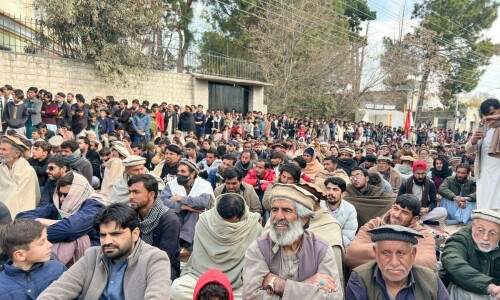NEGOTIATIONS with terrorists have been rejected by democracies in the past, as talks with them were equated with giving them legitimacy and undermining the democratic spirit. Still, many established democracies that have confronted terrorism, have, in fact, negotiated with terrorists/militants. The British government kept up back channel diplomacy with the Irish Republican Army (IRA), despite its subversive activities. Spain negotiated with the Basque Homeland and Freedom group that carried out terrorist acts in the country. Even Israel, which came down hard on terrorism, negotiated secretly with the Palestine Liberation Organisation (PLO).
This means governments do negotiate with terrorists. But the point is, do they compromise on their political system? There are other questions as well: will negotiations bring an end to violence? Are terrorists ready to parley? And should talks happen with the non-state actors themselves or with their political wing?
Prime Minister Nawaz Sharif has finally constituted a committee for talks with the TTP, which has nominated people from the settled areas to represent it, contrary to our expectations that the negotiators would be from among its own ranks. Does this mean that the TTP, unlike the IRA and PLO, has no political wing? If that’s the case, it will prove to be a great blow to negotiations which should be initiated by the political wing of a group.
The militants’ understanding of politics is incomplete, otherwise they would have tried other measures before resorting to arms. Keeping this in view the question is how come the TTP wants to talk to the government? Answers are required otherwise the future of talks will remain doubtful.
The willingness of the TTP as a negotiating partner depends on its motives — political and ideological. Is it willing to compromise? The PLO compromised on many fronts in the Oslo process. So did the IRA. But the TTP has reiterated its resolve to strive for implementing the Sharia. If they get stuck on this point, it will be viewed as intransigence.
Needless to say they will demand a political role in the tribal belt with changes in keeping with their ideology. It will result in a one country-two systems policy. Will Islamabad accept it? The Taliban have yet to drop their weapons. If talks fail, the TTP will resort to terrorism again.
There are two types of negotiating partners. They consist of the confrontationists who believe in terrorist tactics more than in negotiations, but because of circumstances go for talks. The other type believe in conflict resolution and in the principle of give and take. They are more concerned about achieving their political objectives rather than terrorising society. The TTP fits in with the confrontational variety, while the IRA and PLO showed themselves as more accommodating during negotiations.
A terrorist/militant group possesses ideology as well as the means of violence to pursue its objectives. The government must focus on these. Violence perpetrated by the terrorists can’t be tolerated for long. And during negotiations, the understanding must be imparted to the adversary that what they perceive as armed struggle will not further their aims and they must explore alternatives. This was the message that was given to and understood by the IRA and PLO.
When it comes to religious militant groups, they not only promote religion for their objectives, but may also derive their support from a particular ethnic group. However, in the case of the TTP, religion is kept at the forefront, and instead of garnering the support of a particular ethnic group, ie Pakhtuns, it has targeted them more than others.
During negotiations, internal cohesion is important to the militant group. Ostensibly on the run, it may be difficult for it to maintain a perfect chain of command. The central command only gives ideological inspiration and moral support, and more or less complete autonomy is granted to the local leaders for operational logistics. The IRA was an example and currently Al Qaeda is similarly organised. The TTP is following them.
At this time, it is important that a negotiating government ensures that the terms of engagement are acceptable to the leadership of not only a particular militant group but also to its local leaders who operate almost independently. Thus the TTP during its first round of talks must pledge that it is representing all its wings.
Successful talks would mean an end to violence. However, it must not be a continuing chain in which Islamabad keeps negotiating with TTP (A), TTP (B), TTP (C), etc. There has been enough of terrorism in Pakistan. Peace must be given a chance. There are examples of successful negotiations before us, and we should try to emulate these — after answering some hard questions.
The writer is head of the FATA Governance and Peace Institute, Peshawar University.











































